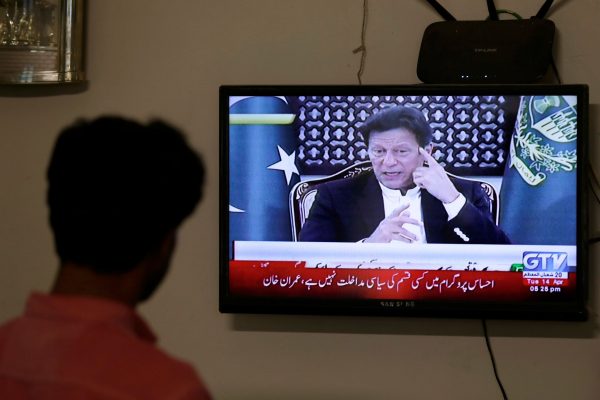The central government’s decisive leadership and coordination with the provinces through the information aggregating National Command and Operation Centre explain Pakistan’s successes in containing its first wave of COVID-19. This intervention took the form of a sharp lockdown in March, followed by a gradual easing of restrictions and localised quarantine measures.
These measures were accompanied by an US$8 billion economic relief package that included targeted income support for the most vulnerable. The government’s actions were complemented by the outstanding generosity of Pakistan’s people who, while reluctant to pay direct taxes, are enthusiastic contributors to charitable causes. COVID-19 was initially contained and life able to get back to a semblance of normalcy.
But Pakistan’s success early on engendered complacency. Compliance with safety protocols such as mask wearing and social distancing is limited. Pakistan’s government is having a hard time convincing people of the seriousness of the virus as a second wave strikes.
While Pakistan’s COVID-19 response deserves praise, there are troubling indications that the government has yet to get its act together in managing the economy, its own administration and dealings with the opposition. On the economic front, the Pakistan Tehreek-e-Insaf (PTI) government has faced successive crises. While some of them can be attributed to the failures of its predecessor — the former Pakistan Muslim League-Nawaz (PML-N) majority government — others, like the sugar and wheat heists that have seen prices of essentials surge, are purely a result of its own economic mismanagement.
Food price inflation for many critical items is in double digits month-on-month. While people are finding it difficult to buy tomatoes, Pakistan’s tax-to-GDP ratio has fallen from about 10 per cent in 2018–19 to 9.5 per cent in 2019–20. Pakistan’s energy sector debt has risen by over PRs 1.1 trillion (US$6.9 billion) since the PTI government took office and now stands at PRs 2.3 trillion (US$14.5 billion). With the economy facing the added burden of absorbing COVID-19 shocks, Pakistan will fall short of the 7 per cent economic growth rate it needs to cater to its young and rapidly growing population.
On the administrative front, nearly midway through the PTI’s tenure, no major policy initiatives have materialised. Pakistan’s day-to-day governance has remained every bit as whimsical and vicious under the present government as it was under the previous PML-N administration. Punjab’s PTI Chief Minister Sardar Usman Buzdar has become a byword for confusion and policy inertia. A ham-fisted accountability drive has made government executives reluctant to make decisions. The PTI is not meeting the expectations of better governance it was elected on.
The PTI also has a poor record on dealing with the opposition, managing dissent and supporting freedom of expression. Pakistan’s Prime Minister Imran Khan criticises India’s transition to communal fascism and eloquently draws attention to Islamophobia in the West. Yet Khan’s government is presiding over repression not seen in Pakistan since the 1980s military dictatorship. This is not just about going after opposition political figures for corruption, which is often justifiable, but has also become about stifling any dissent that is critical of the country’s military. This is done while giving religious fundamentalists free rein to abuse, intimidate and murder those they disagree with.
The government brought in draconian rules under the 2016 Prevention of Electronic Crimes Act that left social media companies threatening to pull out of Pakistan. The October arrest of Sindh province’s Inspector General of Police by members of the central government’s security apparatus was also unusual. This was done to force the registration of a case against Muhammad Safdar, the son-in-law of the former PML-N prime minister Nawaz Sharif, for disturbing the sanctity of the Jinnah Mausoleum — the resting place of Pakistan’s founder Muhammad Ali Jinnah. The security officials involved were later deemed to have acted overzealously and removed from their posts after furious public backlash. Not even the Chinese have been spared the effects of the present government’s penchant for conscientious stupidity — TikTok, an app with 20 million Pakistani users, was banned for 11 days in October 2020 for failing to moderate indecent content.
Pakistan’s relatively successful handling of the COVID-19 pandemic is indicative of what the country can do if its leaders commit themselves to act in the country’s interest. Regrettably, replicating this behaviour on a range of other issues has proven impossible given the inability of the political class — both the government and opposition — to comprehend where the larger public interest lies.
With a shaky economy, an increasingly paranoid government attitude towards criticism, rising religious extremism and deeply troubling governance and demographic indicators, the path ahead for Pakistan is fraught with danger. But then again, some might argue that this is the default setting for Pakistan, one it has had to contend with since its founding in 1947.
Ilhan Niaz is Associate Professor at the Department of History, Quaid-i-Azam University, Islamabad. He is the author of The State During the British Raj: Imperial Governance in South Asia, 1700-1947 (Oxford University Press, 2019).
This article is the first in an EAF special feature series on 2020 in review and the year ahead.

